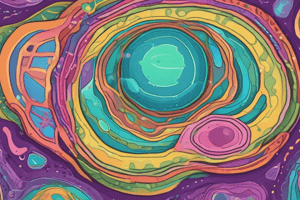Podcast
Questions and Answers
What are the folds in the inner membrane of mitochondria called, where chemical reactions occur?
What are the folds in the inner membrane of mitochondria called, where chemical reactions occur?
- Lamellae
- ATP synthase
- Cristae (correct)
- Porins
Which molecule is primarily produced by the mitochondria during cellular respiration?
Which molecule is primarily produced by the mitochondria during cellular respiration?
- FADH2
- Glucose
- ATP (correct)
- NADH
Which cycle is NOT associated with ATP production in mitochondria?
Which cycle is NOT associated with ATP production in mitochondria?
- Krebs cycle
- Glycolysis (correct)
- Tricarboxylic acid cycle
- Citric acid cycle
What role does cytochrome C play in mitochondria?
What role does cytochrome C play in mitochondria?
Where does the material exchange occur within mitochondria?
Where does the material exchange occur within mitochondria?
Which of the following is NOT a function of mitochondria?
Which of the following is NOT a function of mitochondria?
What is the role of porins in the mitochondrial outer membrane?
What is the role of porins in the mitochondrial outer membrane?
What is the primary function of mitochondria in eukaryotic cells?
What is the primary function of mitochondria in eukaryotic cells?
How do mitochondria reproduce?
How do mitochondria reproduce?
What hypothesis explains the origin of mitochondria?
What hypothesis explains the origin of mitochondria?
Where are mitochondria located within eukaryotic cells?
Where are mitochondria located within eukaryotic cells?
Which of the following cell types does NOT contain mitochondria?
Which of the following cell types does NOT contain mitochondria?
Which component of mitochondria surrounds the organelle?
Which component of mitochondria surrounds the organelle?
What is one potential use of transformed mitochondria?
What is one potential use of transformed mitochondria?
Which statement is true about the number of mitochondria in cells?
Which statement is true about the number of mitochondria in cells?
Study Notes
Mitochondria: Definition and Origin
- Double-membrane-bound organelles found in the cytoplasm of eukaryotic cells.
- Often called "mito," they are crucial for cellular energy production.
- Unique among organelles due to their double membrane and reproduction via binary fission.
- Hypothesized to have originated as free-living bacteria engulfed by a larger cell. This endosymbiotic theory explains their unique characteristics.
Mitochondria: Location and Distribution
- Located in the cytoplasm of eukaryotic cells, which include human cells.
- Absent in red blood cells (erythrocytes).
- Number varies widely among cell types; liver cells can contain thousands, while some cells have none.
- Transformed mitochondria can be introduced into recipient cells through co-incubation, with potential therapeutic applications.
Mitochondria: Structure and Components
- Outer membrane: Contains porins (protein channels) allowing passage of small molecules and proteins; also houses enzymes.
- Inner membrane: Forms cristae (folds) where energy production occurs.
- Intermembrane space: Region between membranes; involved in material exchange and signaling pathways.
- Matrix: Innermost compartment; contains mitochondrial DNA and enzymes for ATP production.
Mitochondria: Functions
- ATP Production: Generates adenosine triphosphate (ATP), the cell's energy currency, through the citric acid cycle (Krebs cycle/TCA cycle) and oxidative phosphorylation. ATP synthase, an enzyme on the inner membrane, is central to this process.
- Apoptosis Regulation: Releases cytochrome C to activate caspases, enzymes initiating programmed cell death (apoptosis). This is important for removing damaged or infected cells.
- Calcium Regulation: Acts as a calcium store and buffer, influencing calcium levels within the cell, a key element in various cellular processes (neurotransmission, muscle function, blood clotting).
Studying That Suits You
Use AI to generate personalized quizzes and flashcards to suit your learning preferences.
Description
This quiz explores the fascinating world of mitochondria, their origin, structure, and importance in eukaryotic cells. Learn about their unique characteristics, distribution in various cell types, and the implications of their function in energy production. Test your knowledge of this vital organelle!




